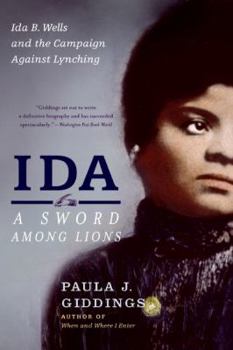Ida: A Sword Among Lions
Select Format
Select Condition 
Book Overview
Pulitzer Prize Board citation to Ida B. Wells, as an early pioneer of investigative journalism and civil rights icon From a thinker who Maya Angelou has praised for shining "a brilliant light on the lives of women left in the shadow of history," comes the definitive biography of Ida B. Wells--crusading journalist and pioneer in the fight for women's suffrage and against segregation and lynchings Ida B. Wells was born...
Format:Paperback
Language:English
ISBN:0060797363
ISBN13:9780060797362
Release Date:March 2009
Publisher:Amistad Press
Length:832 Pages
Weight:1.35 lbs.
Dimensions:1.5" x 5.3" x 8.0"
Age Range:19 years and up
Grade Range:Postsecondary
Customer Reviews
4 ratings
She is restored to where she should be!
Published by Thriftbooks.com User , 14 years ago
This is a well researched book on an American Heroine. Ida wrote when it was dangerous for Black People and Women. 1880's to 1930. Paul Giddings has done a masterful job of bringing this story to the forefront. The book is long but worth every minute. I only wish I could see a picture mentioned in the book about Ida marching in the 1913 Women Suffrage March in Washington DC with her White Illinois Delegation. She refused to march in the back as the Southern Women Delegations asked. AS a student of history, I would give this a A Plus.
Injustice Anywhere Is A Threat to Justice Everywhere
Published by Thriftbooks.com User , 15 years ago
Ida: A Sword Among Lions is a great biographic start for students of history. It provides thought provoking and pain staking details of a hurricanic time in American history...and Ida B. Wells-Barnett was the eye of the storm. She uprooted anyone or anything that stood in the way of justice for African-Americans- from lynchings to women's suffrage, jobs and politics. As a woman, she was before her time in aggressive-ness, assertiveness, and intelligence. I would dare say that the majority of her problems with her contemporaries were gender related. Giddings took a complicated and complex woman during a crucial era and produced a compelling contribution to African American history and the history of the Women's Movement. The book was too long, but will wet your appetite to learn more about the people, places, and events so thoroughly documented in this biography.
EXCELLENT HISTORY!!!!
Published by Thriftbooks.com User , 15 years ago
I wanted to read about this wonderful woman I've heard so much about. I also wanted to read about her since she lived during the same time as my great grandparents . I've been studying the family history and I get a great since of what their lives were like. A must read for anyone wanting to know the history of that day. Lots of things happening then apply to our current history. Written in excellent style and great understanding.
The horror of lynchings
Published by Thriftbooks.com User , 16 years ago
In 1893, the "Chicago Inter-Ocean", a mainstream metro newspaper, commissioned 30 year old Ida Wells to investigate a crime. A black man, accused of murdering two white girls, had been mutilated, burned to death and left hanging from a telegraph pole. Wells made the trip, assumed the identity of the dead man's widow, tracked down eyewitnesses and published her findings in detail. The Introduction describes the history of lynching and serves as a backdrop to Wells's crusade against lynching: "The origin of the term "lynching," according to James E. Cutler, author of "Lynch-Law" (1905)[a full copy can be found on Google Books], the first scholarly text on the subject, is attributed to Charles Lynch, a Virginia justice of the peace (and brother of the founder of Lynchburg). Lynch established informal, extra-legal citizen juries during the Revolutionary War years when official courts were few and traveling to them through British-occupied territories was perilous. The common sentence for those found guilty--mostly horse thieves and Tories--was thirty nine lashes with a whip. By the 1830s, when southern abolitionism reached its height, lynching was associated more with those who threatened the slave order. Following the Civil War, the practice became more murderous with the bloody struggle for power among northern federalists, Confederates, and newly enfranchised black men. "However, it wasn't until 1886, when increasing numbers of rural blacks migrated to southern cities, that the number of African Americans lynched exceeded that of whites: a trend that continued even as blacks became increasingly disenfranchised; had largely eschewed their political aspirations in favor of building institutions, acquiring wealth, and eliminating ignorance; and ex- Confederates had regained control of their state governments. Both Wells and Cutler cited what were surely conservative estimates by the Chicago Tribune, which reported that 728 persons were lynched between 1882 and 1891, the majority of them African American men. The statistics further showed that less than a third had been accused of rape, much less guilty of it." In 1893 Wells was established as a black journalist, co-editor and part-owner of the "Memphis Free Speech". A white mob seized the three black men and killed them in a railroad yard duplicating wounds suffered by three white deputies. Wells urged her black readers: "Save our money and leave a town which will neither protect our lives and property, nor give us a fair trial in the courts." Memphis blacks took her advice and departed by the thousands to the West, and those who stayed behind boycotted streetcars and quit their jobs. Business owners panicked and commerce "came to a standstill," Wells would recall with some satisfaction. Wells used the "Free Speech" to respond to an editorial supporting lynching. The South was menaced by the "horrible and bestial propensities" of black men, whose seething ambition was to catch a white woman alon





